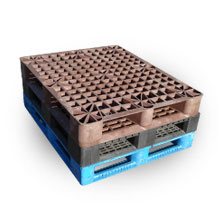Why You Should Use Plastic Pallets For Import-Export Shipping
25 Nov 2017
When it comes to using export and import shipping, wooden pallets perform less well than plastic ones every time. Plastic pallets export can save you time and money and help to avoid spoilt goods. Here’s why.
1. You Don’t Have ISPM-15 Certification to Worry About
ISPM-15 is the protocol that is applied to wooden pallets moving around the world. Because the pallets can harbour pests, fungal growths and so on, every pallet has to be certified as treated to prevent these problems. They must be properly stamped by the national certifying authority. If they aren’t, your consignment can be held up in port while the wooden pallets are fumigated. They may even be burned.
Of course, the diseases that can be harboured in wood mean that wooden pallets aren’t suitable for many types of goods anyway. So these shipping plastic pallets eliminate a raft of practical and bureaucratic problems when exporting.
2. They Are Safer for Everyone When in Transit
Plastic is free from nails, splinters and rough edges. So these pallets are less likely to be thrown about or subject to rough handling because operators aren’t worried about getting injuries from contact with them.

3. They Are Economical
There are several ways in which these pallets are cheaper than using wood ones. Wood pallets often last only three to five years. Plastic ones are far more durable, lasting up to ten years. They are also about 30% lighter than wooden pallets of a similar size, and this frequently means lower transport and shipping costs. Unlike wooden pallets, plastic ones are often stackable, so they take up less space and more pallets can be loaded into a smaller volume.
4. You Can Select Pallets Specifically for Your Goods
Export and import can involve moving many different types of goods, each with different requirements for transportation. There are many different types of plastic pallet, and you can match the pallet to the requirements of the goods you are exporting. For example, if you’re shipping chemicals or volatile products, you can get spill-control and anti-spill pallets designed to prevent liquids leaking from the pallet. This isn’t possible with wooden pallets.
5. Cleanable and Hygienic, Plastic Can Be Reused
If the pallet is contaminated in any way, it can be cleaned and quickly dried for reuse. If wood has to be pressure-washed, it takes a long time to dry out again. Because the plastic surface is flat, without holes or joints, there is nowhere for insects to burrow or bacteria to colonise. Therefore, even when shipping goods such as food or pharmaceuticals that require high hygiene standards, a plastic pallet can be reused repeatedly and cleaned between uses.
With plastic pallets export and import become easier, simpler and more economical. You can ship a wider range of goods in a smaller space with less damage in transit.
